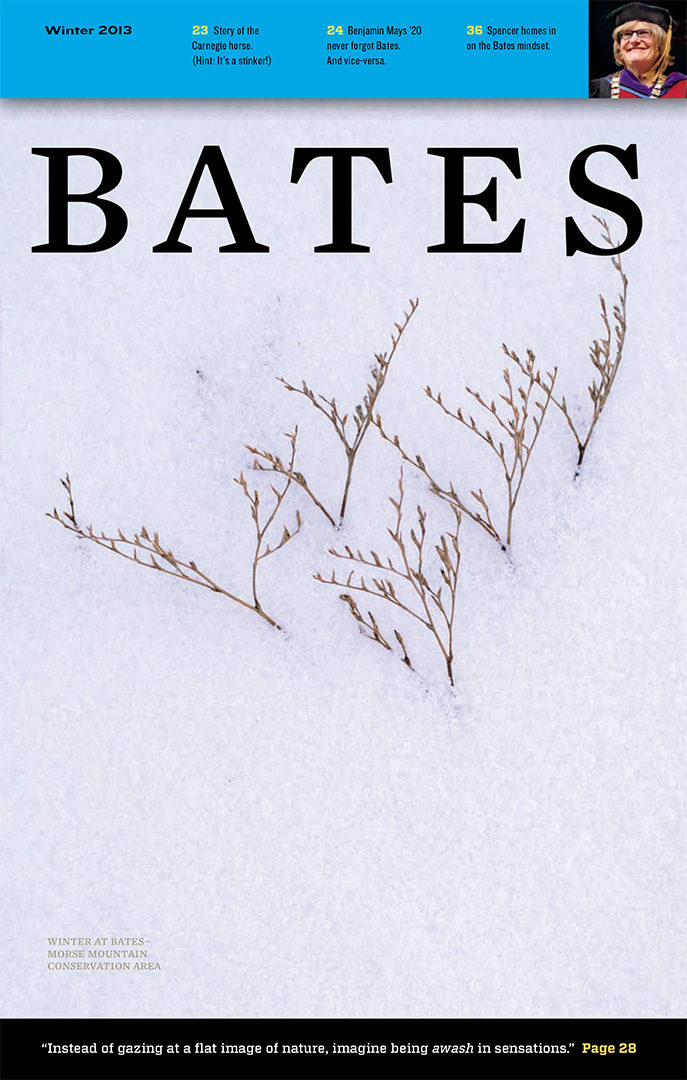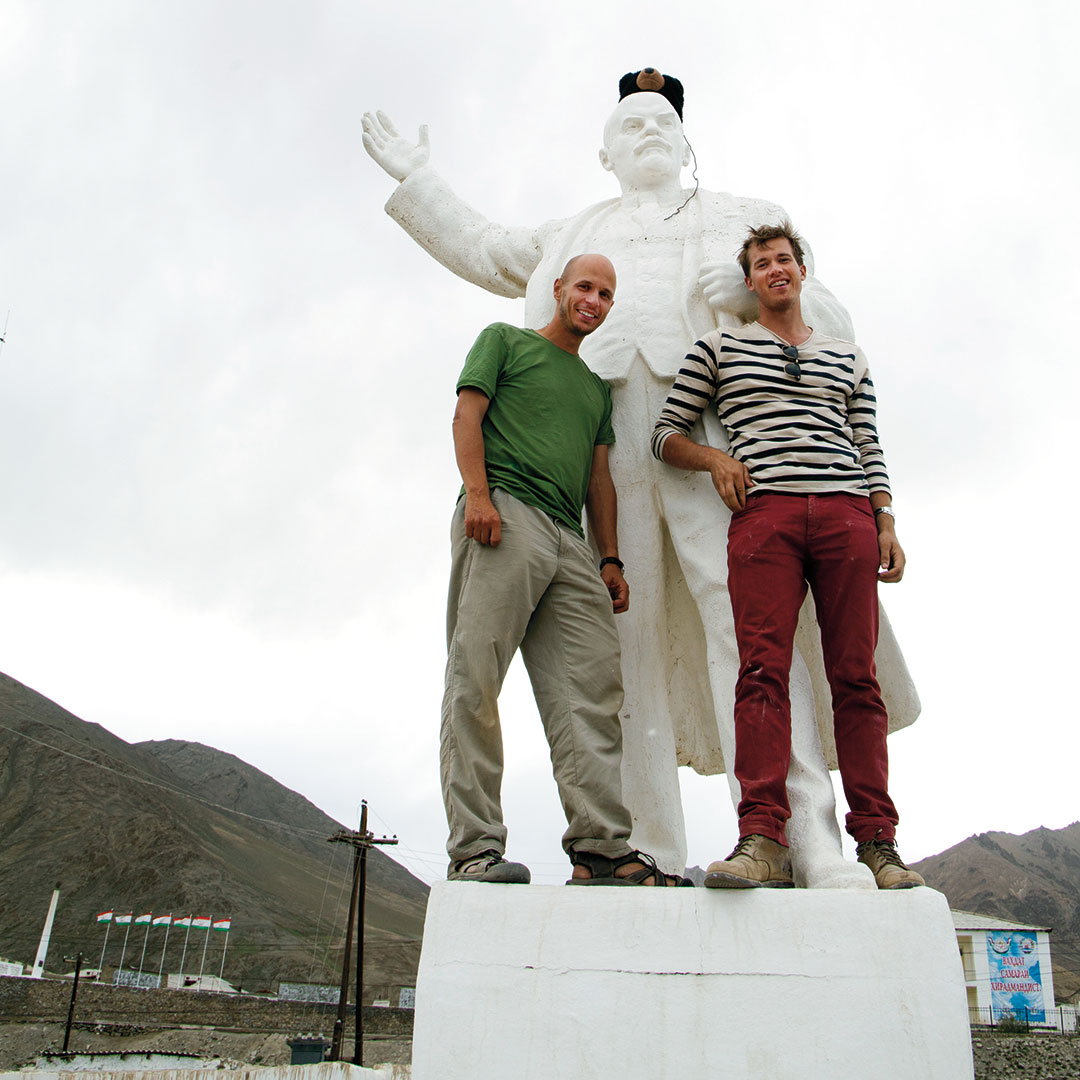
Letters: Memories of Jim Carignan
Opinions from Our Readers
Farm Semester
I thoroughly enjoyed the Winter 2011 issue and the story “Good Eggs.” My love affair with chickens began on a bulletin board at Bates in the spring of 1945. Because of the war and the draft, Bates students could graduate in two and a half years by attending summer sessions. I had been at Bates for two summers, but that was enough. I wanted some other experience.
A small note on the bulletin board asked for volunteers for the Women’s Land Army. This meant working on a farm in Maine to help with the labor shortage. I landed on a family farm in Fairfield. For three months I took care of 1,500 chickens, helped in the fields, fed the bull, and thoroughly enjoyed the experience.
If I hadn’t been at Bates it wouldn’t have happened. Were I at Bates now, I would certainly be involved in social-justice issues. The students who are involved will be influenced for life, as I was by working on a farm.
Rohna Isaacson Shoul ’46
Newton, Mass.
Carignan’s Way
I wish to share a few lessons that I learned from a lifetime mentor and friend, Dean Emeritus of the College Jim Carignan ’61, who died Aug. 14, 2011.
I got to know Jim professionally in 1999, when he asked me to join a civic leadership institute in Lewiston-Auburn. During our work together, he talked about his own growth as a leader. In the trajectory of his story, which became a case study during my doctoral studies, I saw parallels to what leadership theorists have learned about good leadership: At its core, it is about people and relationships.
In his 33 years at Bates, Jim moved from a top-down, command-and-control leadership style to a collaborative and relational approach. As Colin Powell has said, “Leadership is not about organizations…. It is all about people — motivating people to get the job done.”
Jim learned that leadership sometimes means serving as an intermediary and a facilitator of process — a servant leader.
For example, I’m sure some alums recall when seniors, years ago, turned Wood Street into an out-of-control block party during Senior Week. The rowdiness attracted a great number of Lewiston police, and they were on the verge of arresting students when Jim showed up.
He asked the police for 10 minutes so he could work with the students to get them to take control of the situation. In the end, he got the street cleared and the stereos turned down, and the police were able to drive away without making arrests.
This is what Jim said about that event: “If you’re in a crisis situation, you’ve got to change from confrontation to something short of that, where two or three parties are able to fulfill their expectations while respecting the other groups.”
Jim had a reputation for taking risks and for solving problems face to face and in the moment. He once called an open forum in the Chapel on sexual harassment issues that turned explosive but, finally, productive. Afterward, the president told Jim that “one of these times you are going to roll those dice and it is not going to work — but I am glad it worked this time.”
Jim brought an incredible spirit, optimism, and integrity to his leadership. One of his toughest times was going through not one, but two heart transplants. He was on a heart-lung machine for two days before a second heart could be found. In fact, the doctors were reluctant to do a second transplant. But Jim basically said, “Look, we didn’t come this far to turn down a heart. You take me in there and do it. I’ll make it.”
Jim’s third heart was a woman’s heart — he joked that it was the reason he was able to see the relational side of leadership.
In his good humor, his strong and sincere relationships, and his ability to read people, Jim was the best of leaders. He was, and is, a remarkable model.
Joc Clark ’86
Paradise, Calif.
caption: In 2003, Jim Carignan ’61 stands next to an oak planted near the Chapel to honor his retirement as dean of the college.
Is Winning a Losing Proposition?
That was a beautiful photo in the Winter issue of refurbished Garcelon Field, iconic venue for fierce athletic competition. Ironically, a few pages beyond, Bates sociology professor Francesco Duina maintains that we Americans are too competitive and “obsessed” with winning. It makes us unhappy and disliked abroad. He says the Danish noncompetitive system is “more civilized” even though it “does deprive a lot of people of freedom.” He knows they are not the happiest people — “but they are content.”
Americans of my generation will recall that most Danes were “content” to be deprived of their freedom under Nazi occupation, which they endured with only a murmur of resistance. If Americans were like “contented” Danes, America today would be a British dominion fenced in east of the Mississippi by foreign powers who had divided up everything west of it. But, hey, Professor Duina is a sociologist, not a historian.
Neither is he a political scientist, but he thinks that Al Gore is viewed as a loser because he should have won the 2000 election because “his opponent was perceived as weaker.” Perceived by whom? Among those who have experienced American politics and politicians close up, I am not alone in perceiving Al Gore as a phony political windbag.
Professor Duina says that he was inspired to write his book in part because of “George Bush’s insistence on ‘winning the peace in Iraq,’” which he calls “an absurd concept.” Would he apply that label to Barack Obama’s insistence on spending trillions of borrowed dollars on “winning the future”? Probably not. Bates would consider that racist, and he would be shunned in the faculty lounge (assuming that after all the recent building Bates actually has a faculty lounge!).
Professor Duina seems an amiable young man who is probably not obsessed with winning. But he knows how to win in the competitive world of leftist, feminized academia: write a book denigrating America’s competitive spirit and throw in a few barbs at our 43rd president.
Charles W. Radcliffe ’50
Annapolis, Md.
Francesco Duina responds: Mr. Radcliffe, in his comments about my book, Winning, doubts whether I would be critical of President Obama’s recent fixation on “winning the future.” As it turns out, I have discussed our president’s language during town library meetings and in a number of interviews, including with David Phillippi for the blog New Books in Sociology and with Connecticut Public Radio’s Where We Live program. I’ve talked about President Obama’s language about the future, including wanting to be “No. 1” in the world, as “circuitous” and “terribly confusing and loose phrasing,” which is representative of our collective American tendency to view much of life in competitive terms, with serious consequences for how we live our lives, how we educate our children, and how we relate to others.
‘Friendliness Without Pretense’
Kudos for running the very interesting story “Family Affair” (Winter 2011), about my classmates Erik Mercer, Rachel Segall, and Tony Hurley. The article, as well as Rachel and Tony’s uncommon generosity, was a vivid reminder of all of the characteristics that caused me to apply to Bates 25 years ago and are ones that have kept me connected to it: its open and tolerant outlook, the firm commitment to diversity and egalitarian principles, and an enduring friendliness without pretense.
Rachel and Tony’s gift to Erik and Sandro is a very contemporary twist on those ideals. The fact that Bates Magazine ran the story made me proud to be a Bobcat!
Steve Moore ’91
Boston
Passing Thoughts
The article “The Gay Resume” (Winter 2011), which reported on a Homecoming 2010 panel discussion about the intersection of careers and sexual orientation, failed to address the larger implications of identity masking during the job search. The very notion of passing as straight presupposes an understanding of several nuanced conversations. The first is what potential employers might deem “queer,” whether through attire and body language or through a resume that includes certain club affiliations.
The second is procedural: How might one best succumb to hetero-normative stereotypes? And how would doing so merit a capacity for ethical decision making?
The third would be qualitative: How do we measure the emotional, physical, and even monetary sacrifices that one undoubtedly undertakes in order to pass? To this regard, what does the article’s implicit approval of sometimes hiding one’s sexual identity say about other marginalized groups facing issues of discrimination? For example, a black woman cannot with the same ease hide her perceived race or gender, though research abound tells us that both categories will also place her at a disadvantage in achieving the career goals espoused by panelist LK Gagnon, “to be paid and be comfortable.”
While this article does remind us that workplace politics are as complicated as ever, it surrenders to the ill-fated norms of present-day inequalities rather than offering a spirited advance toward the aspiration of our mission statement, where we “engage the transformative power of our differences” and cultivate the very noble notions of “informed civic action” and “responsible stewardship of the wider world.”
Here, at this “college for coming times,” I would’ve hoped for this to be normal practice.
Walter Garcia Fairfax ’12
Stonington, Maine
Please Write!
We love letters. Letters may be edited for length (300 words or fewer preferred), style, grammar, clarity, and relevance to College issues and issues discussed in Bates Magazine. Email your letter to magazine@bates.edu or post it to Bates Magazine, Bates Communications Office, 141 Nichols St., Lewiston ME 04240.




